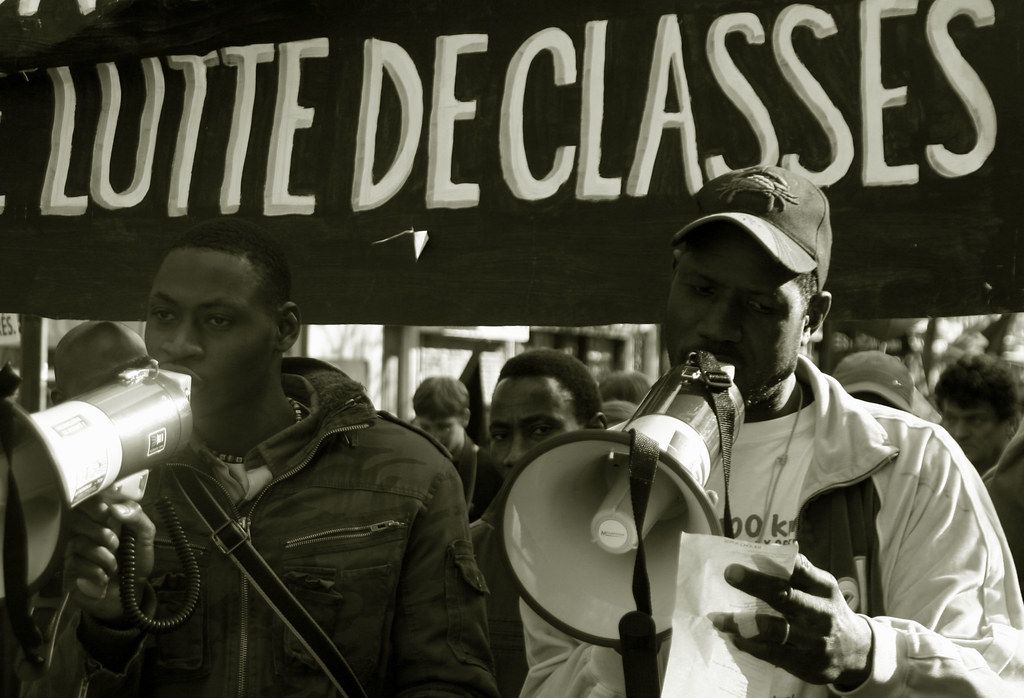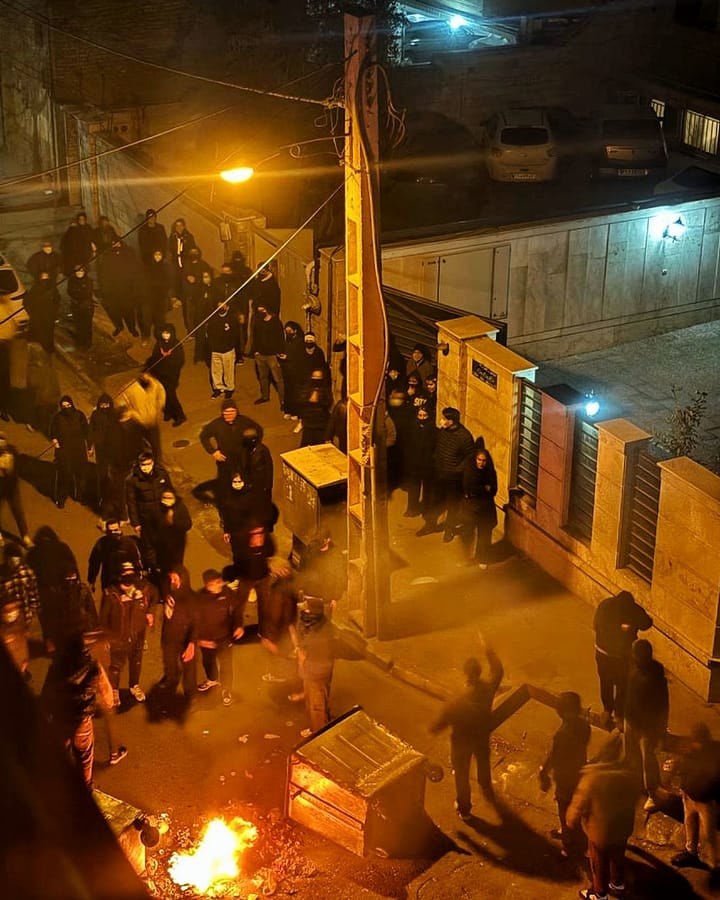The recent and intense attacks on what has been labelled Islamo-leftism, Islamo-gauchisme in the original, is the French iteration of a more global attack on “woke leftism”, or specifically critical race theory, gender studies and postcolonialism, summarized by France’s President Macron as the threat of “certain social science theories from the United States”.[1]
Perhaps surprisingly to non-French readers, gender studies and postcolonial studies have never attained a stable anchorage in the French educational landscape, marked as it is by traditionally dominant disciplines. Feminism and Postcolonial studies, despite the pre-eminence of French theorists such as Luce Irigary, Hélène Cixous, Frantz Fanon, and Suzannne and Aimé Cesaire, and Edouard Glissant, have struggled to gain a foothold in French higher educational and research institutions, and have only done so in a belated and piecemeal fashion in some of the country’s more enlightened sociology, history, and literature departments, or in the occasional research institute.
Indeed, perhaps the only good to come out of the recent ideological and political offensive against “Islamo-leftism” is the unparalleled publicity given to hitherto marginalized areas of study and research. This explosion of intolerance for progressive attitudes, such as espousing diversity in the theatre or speaking out against black-facing, is at heart a manifestation of the recently emerged right-wing cultural and ideological hegemony in a number of countries including the United States, the UK and France, spanning liberal conservative tendencies and racist and nationalist identity politics of the American Alt-Right.
But in France there is a particular politico-historical context which makes this a very peculiarly French ideological battle. Indeed, the context stretches back to the very founding of the first French republic following the Revolution of 1789. The conviction that the Republic must be firmly separated from the religious dates from that moment. It was a conviction that led over a century later to the 1905 law on the separation of church and state. The principle of secularism or laïcité has since become an “article of faith” within French society, especially on the left and in particular in the world of education which is the domain of the state; let us recall that schoolteachers and academics are civil servants bound by a uniform vision of the profession’s duties and responsibilities. Let us recall also that the wearing of religious insignia, such as a cross, a hijab or headscarf, or a star of David in state high schools is strictly disallowed. In the light of this historical context, it is extremely easy for those who denounce so-called “Islamo-Leftism” to adopt the mantle of defenders of a most legitimate, foundational, progressive and desirable order. These latter-day defenders of the faith are naturally averse to concepts of difference and to arguments that favour diversity. In such circumstances, it is also clear that the term “Islamo-leftist” goes straight to the vexed question of the secularism enshrined in the 1905 law. But, the now traditional Republican ideology is one behind which an Islamophobic discourse that runs long and deep in French society may easily shelter.
The contemporary upsurge in Islamist fundamentalism and the deadly terrorism through which it has been expressed over the past decade has, of course, added grist to the mill of those who wish to wage this ideological battle. This historical conjuncture alongside the semantic slippage in the popular imaginary between Islam and Islamist, constitutes a crucial element in understanding the explosive and excessive nature of the current ideological offensive we are today confronting in the French university.
The polemic over Islamo-leftism is a classic example of the power of language and its performative dimension. In late 2020, in the space of a few weeks, those who manipulated the discourse succeeded in imposing a new politic-ideological category in the popular imaginary and in the French media. Of course, the formidable efficacy of the formula “Islamo-leftism” lies in its theoretical emptiness and its semantic malleability. It is a discursive war machine whose principal function consists of mashing together individuals, concepts, institutions, and orders of knowledge in order to identify and designate those deemed to pose a threat to “republican principles and academic freedom”.[2]
A reprise of the recent use of the term “Islamo-gauchisme” by certain government ministers, politicians and conservative media commentators reveals a widespread ignorance of how a university functions, of how its internal power relations operate, and of the disciplinary and epistemological stakes involved. For several months now certain terms have been repeatedly and negatively bandied about in these endless debates like so many bogeymen, but without their ever being explained, defined or put int context; terms such as racialized (racisé), racialists (racialistes), identitarians (identitaires), indigenists (indigénistes), intersectionality (intersectionnalité), gender(genre), decolonial (décolonial), postcolonial (postcolonial) and so on.
In hindsight, it appears that the Minister for Higher Education and Research Frédérique Vidal – taking her cue from utterances made by the Minister for Education Jean-Michel Blanquer several months previously – was unfamiliar with the terms of the debate when, affirming that the University was infected by “Islamo-leftism”, she straight-facedly evoked an alliance between “Mao and the Ayatollah Khomeini” on the popular new channel CNews.[3] The minister’s historical and intellectual confusion resurged when in the same interview, she sported her expertise as a biochemist to put straight misguided academics in the humanities and social sciences who had been led astray by “racialism” reminding them that “in biology, we know that there is only one human species and that races do not exist”.
Two days later, in front of the French parliament, while announcing the opening of an inquiry into militancy in the University, she compounded the impression of harbouring a deep ignorance of the subject, when in the same sentence she associated Postcolonial Studies with the presence of a Confederate flag during the storming of the Capitol. France’s national research organization, the CNRS, who had been given responsibility for the inquiry, responded curtly in a communique in which it raised concerns over political attempts to put academic freedom in question, finding that “Islamo-leftism” corresponded to no existing reality.[4]
Given the inconsistency and mediocrity of the arguments advanced, to engage in a serious critique of the minister’s remarks, and of politicians’ interventions on the theme of “Islamo-leftism” more generally, would serve no useful purpose. We might even feel reassured in the knowledge that this polemic is yet one further example of the digital and televisual spectacle, just one more marketable commodity in the service of non-stop news channels. Unfortunately, there is a serious consequence that has arisen from these flimsy and confused accusations. For all its intellectual vacuity, the polemic has resulted in some powerful collateral damage which may resonate for some time to come: entire swathes of knowledge and theory have been delegitimized in the French public’s eye, now convinced that such academic work is antithetical to “secular and Republican values”. [5]
The intervention of the minister followed a long-running and powerful ideological offensive launched by a group of academics and intellectuals emanating from diverse disciplines who are politically positioned on a spectrum covering the conservative right to the secular, republican left. Amongst the academics at the heart of this offensive is the sociologist and intellectual historian Pierre-André Taguieff who two decades ago coined the expression “Islamo-leftism” to describe what he saw as a “de facto militant alliance between Islamist circles and the far left” in the context of the Israeli-Palestinian conflict.[6]
While questionable and intentionally stigmatizing, the expression “Islamo-leftism” was at first defined relatively narrowly and was aimed at political activists. Until 2021, the expression was confined to polemical usage by the far-right in social media. [7] But the governmental intervention has facilitated the legitimation and popular acceptance of this catch-all expression.
In the historical context of a recurrent Islamist terrorism in France since 2015, and in particular after the beheading of the school teacher Samuel Paty on16 October 2020, a crude conflation had already been effectuated between the scourge of Islamist terrorism on the one hand and a disparate array of concepts, disciplinary fields, and militant practices on the other. The academic work that had been quietly contributing to the recognition of diverse experiences, practices and histories within French society have now been constructed as a threat to the cohesion of the nation and the stability of its institutions. Those whose writings lay bare the fiction of cultural homogeneity, enduring gender and “racial” inequalities and discrimination, or the impact of colonial history on language, imaginaries and epistemologies now risk being targeted in this ambience of neo-McCarthyism as enemies within, and dubbed the “useful idiots” of radical Islamism.
Created in January 2021, the “Decolonialism and identitarian ideologies observatory” (Observatoire du décolonialisme et des idéologies identitaires) is one of the agents of this ideological war waged in defence of “autonomy in research and science” (l’autonomie de la recherche et de la science ) – science used here in the Continental sense of academic knowledge in general.[8] The objective of this observatory is to identify, list and denounce research initiatives perceived as infected by ideology and militancy. The first lines of the observatory’s call to arms talk of an “unprecedented identitarian wave in the heart of higher education and research”:
A militant movement aims to impose a radical critique of democratic societies in the name of “decolonialism” and of an “intersectionality” believing it is combatting inequalities by assigning each and every person to identities defined by “race”, religion, sex and “gender”. In discourses that confuse knowledge and propaganda these societies, lumped together as “the West” with complete disregard for any rigorous geographical or historical approach, are condemned as colonial and patriarchal and as places where “systemic racism” is prevalent.[9]
The observatory has recently released a report whose methodological shallowness is rivalled only by its toxicity.[10] Promoting what it describes as an “epistemological militancy with regard to the quality of academic publications”, the document aims to list all instances of “ideology” (a term that is left undefined) occurring within the French academic world: seminars, conferences, research centre themes, thesis subjects, journals, articles and even job announcements.[11] The issues and concerns targeted are designated as those belonging to the camp of the “exponents of deconstruction”: feminism, intersectionality, non-Western area studies, issues of borders and migration, decoloniality, cultural transfer, racial discrimination, and more generally the transdisciplinary approaches of what in French is often disparagingly referred to as “les Studies”, signifying gender studies, cultural studies, postcolonial studies, environmental studies and so on, perceived as challenging the established disciplines. Self-appointed guardians of Knowledge and Reason, those subscribing to the Observatory’s agenda aspire to the pretentious and censorious mission of identifying “ideologies” they qualify as “anti-Republican” and as “matrices of dislocation of the Nation”. [12]
In light of the belated and timid appearance of postcolonialism in the French academy, the coalescing of these attacks around a supposed stranglehold of post- and decolonial studies on the French university would be risible were the stakes less important.[13] Despite the reluctant political decolonisation that followed first France’s 1954 humiliation at Dien Bien Phu, and then the bitter defence of the empire that ended in Algeria’s independence in 1962, French society has been slow to recognize its decolonial condition. In the case of the French Caribbean and other still French possessions, with the rare exception of New Caledonia, the completion of the process of territorial decolonization is no longer even envisaged. Nevertheless, in the intellectual domain those working in postcolonial studies, – and in an academic lineage that stretches back to Suzanne and Aimé Césaire, Frantz Fanon and Albert Memmi – have attempted to rethink the colonial legacy of contemporary Euro-American societies in terms of their histories, their cultural productions, their languages and their knowledge, that is to say, the visible and invisible traces in these societies of several centuries of colonial domination and a slave system legitimated by the category of “race”.
The intellectual project of Postcolonial Studies – a domain whose fecundity and diversity, both theoretical and ideological – is perceived with good reason as a threat by the diehards of a hijacked, republican, universalism which has too often served as a screen for an exclusivist and monocultural French identity. Guardians of the temple of a “one and indivisible” secular Republic blinded to difference in the name of égalité or equality, the champions of anti-decolonialism cannot abide that a critical regard should shed light on both the historical traces and the ongoing consequences of colonialism.
The academic tendencies targeted by this conservative offensive are thematically, methodologically and disciplinarily diverse. Their common factor lies in an ambition to interrogate and critique discursive, historical and social mechanisms that participate in the preservation of discrimination based on gender, “race” and class in contemporary societies. These academics are committed to a critical procedure that aims to unmask practices, imaginaries and categories of language which perpetuate mechanisms of domination by assigning individuals to fixed identities within intangible borders.
Paradoxically, anti-decolonialists and the defenders of supposed Republican purity turn the world on its head when they tax the so-called “Islamo-leftists” with racism and identitarianism, but who in reality merely point to the deficiencies of a universalism long tinged with cultural and racist ethnocentrism. Indeed, it is precisely those accused of “Islamo-leftism” who aspire to an equality that respects cultural and historical differences, and at the same time promotes a renewed vision of universal human rights.
Florent Villard is a Professor at the University of Rennes (IEP-ARENES). Gregory B Lee is a Professor at the University of St Andrews. Both authors are founding members of the Institute for Transtextual and Transcultural Studies (IETT), Lyon.
[1] Norimitsu Onishi, “Will American Ideas Tear France Apart? Some of Its Leaders Think So”, The New York Times, Feb. 9, 2021. https://www.nytimes.com/2021/02/09/world/europe/france-threat-american-universities.html
[2] According to a collective letter to Le Monde signed by a hundred academics in October 2020. https://www.lemonde.fr/idees/article/2020/10/31/une-centaine-d-universitaires-alertent-sur-l-islamisme-ce-qui-nous-menace-c-est-la-persistance-du-deni_6057989_3232.html
[3] 14 February 2021.
[4] CNRS Communique, “ L’ ‘islamogauchisme’ n’est pas une réalité scientifique” , 17 February 2021. https://www.cnrs.fr/fr/l-islamogauchisme-nest-pas-une-realite-scientifique
[5] Jean-Michel Blanquer in evidence to the French Senate’s commission of inquiry into Islamic radicalisation on 18 June 2020: “There are very powerful Islamo-leftist tendencies in the higher education sectors” (Il y a des courants islamo-gauchistes très puissants dans les secteurs de l’enseignement supérieur).
[6] Hadrien Brachet in an interview with Pierre-André Taguieff Marianne, 19 February 2021.https://www.marianne.net/societe/entretien-avec-pierre-andre-taguieff-premiere-partie-quest-ce-que-lislamo-gauchisme
[7] David Chavalarias, “‘Islamogauchisme : le piège de l’alt-right se referme sur la macronie”, 21 February 2021. https://iscpif.fr/chavalarias/?p=2067
[8] Nathalie Heinich, Research Director at the CNRS and active member of the observatory on the radio station, France Inter, 28 May 2021. https://www.franceinter.fr/emissions/l-invite-de-8h20-le-grand-entretien/l-invite-de-8h20-le-grand-entretien-28-mai-2021. See her recent manifesto entitled “Ce que le militantisme fait à la recherche” (On what Activism is doing to Academic Research), Tracts (n°29), Paris, Gallimard, 2021.
[9] https://decolonialisme.fr/?page_id=1000
[10] Xavier-Laurent Salvador “Rapport sur les manifestations idéologiques à l’Université et dans la Recherche “, 10 May 2021. https://decolonialisme.fr/?page_id=5178
[12] https://decolonialisme.fr/?page_id=5178
[13] Marie-Claude Smouts, “Les études postcoloniales en France : émergences et résistances “, in Achille Mbembe, Françoise Vergès (eds.), Ruptures Postcoloniales, Paris, La Découverte, 2010, pp. 309-316. https://www.cairn.info/ruptures-postcoloniales–9782707156891-page-309.htm
The photograph that illustrates this article is titled “lutte de classes/ class struggle” by Farfahinne and licensed under CC BY-NC-SA 2.0



